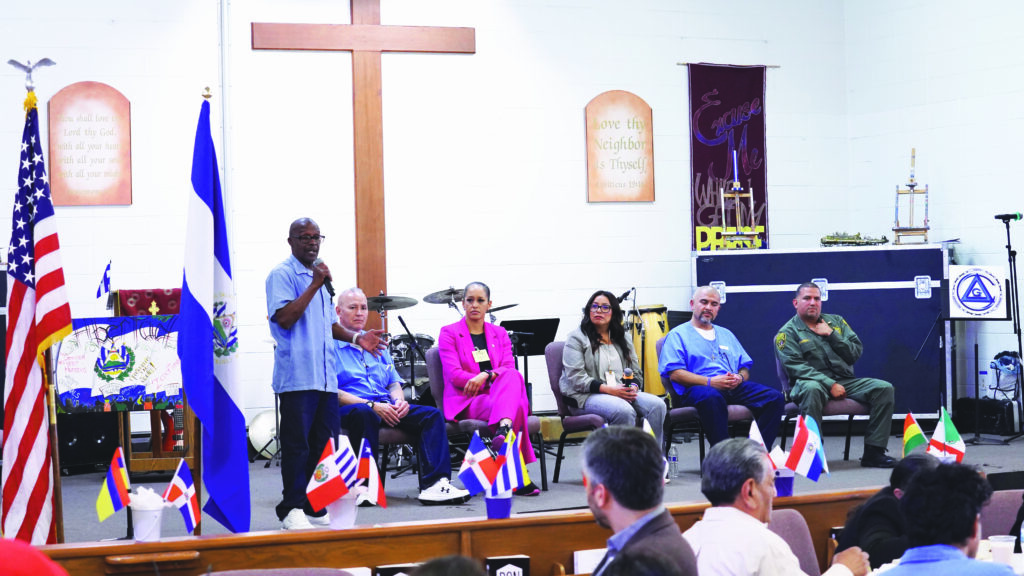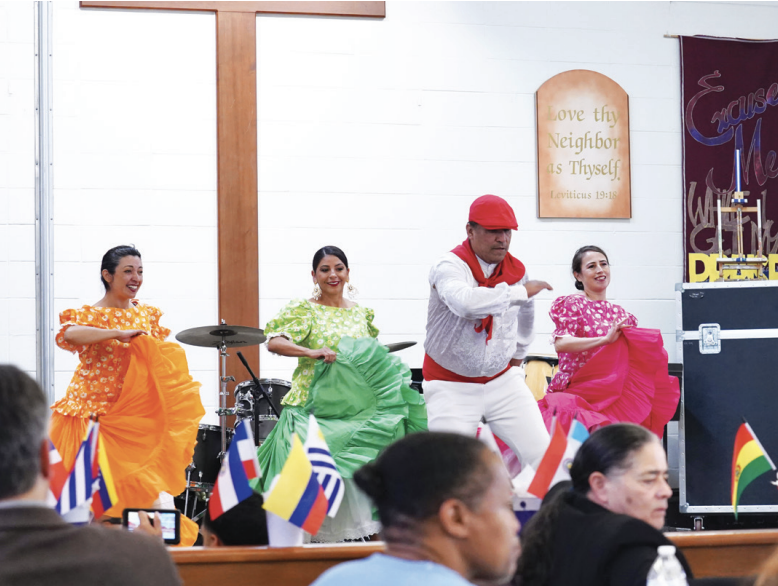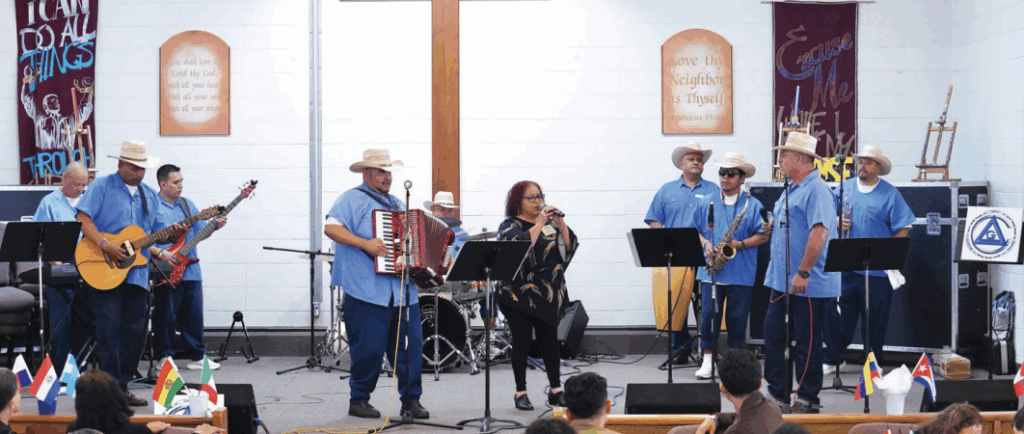San Quentin event provides platform for decision-makers to hear the voices and fears of residents facing deportation

As fear of Immigration and Customs Enforcement raids and deportation cause disturbances in society, resident Edwin E. Chavez chose to raise awareness by hosting a dialogue about rehabilitative efforts and the challenges incarcerated immigrants face after prison.
Chavez invited public officials, prison administrators, and social justice community members to participate in a panel discussion during Fiesta de San Salvador at San Quentin Rehabilitation Center.
Chavez is an El Salvadorian native who knows all too well about how people are mistreated in a prison like CECOT, an El Salvadoran detention facility, because this is the reality of his brother, Gabriel V. Chavez.
After serving 32 years at Salinas Valley State Prison, a high security level facility, Gabriel received a parole grant in May 2022, but he did not go home; he ended up spending two additional years in an ICE detention facility center, deported to El Salvador, and detained at the Terrorist Confinement Center, CECOT.
“It really bothered me for the simple fact that, yes, we are former perpetrators, we committed our crime, we deserve punishment, and we deserve incarceration,” said Edwin Chavez. “But in the course of [our incarceration] comes the journey of rehabilitation and reform, and my brother was able to do that.”
As the event got underway, Elizabeth Hurren, mother of the Chavez brothers, sat at a large round table at the front of the chapel. The room resembled a reception-style event space with tables and chairs scattered throughout.
The celebration was not all food and festivities, as San Francisco District Attorney Brooke Jenkins, San Quentin’s Chief Deputy Warden R. Rosales, and former Community Resource Manager Lieutenant R. Gardea, who were part of the assembled panel, answered tough questions about immigrants and rehabilitation.
Resident Juan Haines moderated the panel, first asking panel members to share a little about themselves. After introductions, panel members received questions from the audience.
Brad Zukerman, an attorney with Uncommon Law, a nonprofit that assists incarcerated individuals and their families with parole board preparations, asked, “To what extent would you be willing to be participants in supporting pardons from the governor and petitions from the individuals [in San Quentin Rehabilitation Center] who’ve clearly done the work and rehabilitated themselves? Like whether you’d be active participants or partners in their efforts to get pardoned to erase the potential for immigration consequences.”
The question quieted the room as everyone wanted to hear from panel members.

DA Brooke Jenkins said that she understands why considering a recommendation like that is important in the current political climate.
“That might require some extreme level of work on our part, or decisions on our part that we wouldn’t ordinarily make, but it’s something that needs to be discussed,” said Jenkins. “What are all the mechanisms that we have to protect against this particular issue?”
Chief Deputy Warden R. Rosales is the first Latina to hold the Chief Deputy Warden position at SQ. Rosales said 25 years ago she was a caseworker assigned to work with the condemned population. She said working with foreign nationals sentenced to death allowed her to be a voice for the Spanish-speaking community.
As to the question raised about supporting pardons from the governor and petitions from SQ residents who have done the work to rehabilitate themselves, Rosales said, “There is so much that one wishes one could do. We already have processes by which we can recommend that people be resentenced to time served in some cases, where they can be immediately released.”
Rosales did not go into any detail about the processes, but added, “As to the consequences regarding deportation, I would like to see a proposal to see what role we can play.”
The Fiesta de San Salvador event was the perfect platform for decision-makers to hear the voices and fears of the people who face possible deportation.
Incarcerated panel member Arturo Melendez said being at SQ has given him the opportunity to attend several programs that were not available at Pelican Bay, which is where he started his prison term after his murder conviction in 2000. He talked about how he held onto old gang beliefs until he became tired of what other people thought of him.
“When you are really ready to leave that gang life behind, opportunities are there. I just had to ask for them,” said Melendez, who added that his time in solitary confinement came down to him not wanting to look weak to others. “These [programs] really helped me dig into my past and now I am not thinking about my family, but my victim and his family.”
SQ’s Catholic Chaplain, Rev. George Williams S.J., asked that community members and the government recognize the rich culture that all people add to the world.
“Today, we lift up all undocumented people who live in the shadows in society. May this celebration be a celebration of hope,” said Rev. Williams.

Guest speaker Alex Sanchez, of Homies Unidos, said individuals should hold public officials accountable. Sanchez is formerly incarcerated and told the audience that getting involved consisted of simply writing a letter.
“Today, you can get involved by writing a letter and sending it to your lawmaker or to Homies Unidos,” said Sanchez.
Resident Edgar Contreras said that there is no comparison between SQ and an El Salvadoran prison.
“I feel sad for what the people are going through with [the President’s administration],” said Contreras. “If I was to compare the prison in El Salvador to this one, El Salvador is hell and this is heaven.”
San Quentin’s Warden C. Andes said that he is proud that he can be a part of events like this one because it shows inclusivity and it creates the type of environment that people seldom get to see at other facilities.
“I don’t think anyone does it better than San Quentin. This is my eighth institution, and every institution has what we call prison politics,” said Andes. “At San Quentin we bring equal opportunity for rehabilitation for all cultures.”
Resident Haines agreed with Andes. Haines shared his experience working with the population, witnessing the different programs, and listening to the population voice their fear of deportation.
“The rehabilitative programs [at San Quentin] for me are unimaginable. They offer incarcerated people the opportunity to transform their lives, to become productive within themselves,” said Haines. “Then if you’re from El Salvador and you go through all of this, you may not be able to reap the benefits of this big transformative life and that happens. That is what’s happening today: we are judged by what we did in our past to determine our future.”
One program the prison administration supports is the symposiums, where residents invite lawmakers, public officials, educators, and social justice organizations into the prison to participate in dialogue with residents at different levels of rehabilitation. Together, they brainstorm solutions to topics like the criminal legal system, public safety, the school to prison pipeline, and reentry.
Jenkins is one of many district attorneys who have sat down with incarcerated residents to address problems inside prisons and in society.
“What I have taken away from coming into San Quentin over the past two years is the ability to understand the failures in the [criminal legal] system and how to work with the incarcerated population to fix the failures in the system as best we can,” said Jenkins. “One thing we learned is how little the resources are that are available to people immigrating into our country.”
Edwin Chavez said he understands that politics is something that he can’t control, but he hopes those who do make decisions can take a closer look at the rehabilitative work happening in prisons.
“For my brother’s situation, I know it is a federal thing when it comes down to immigration,” said Chavez. “But I think that it will be a good thing for foreign countries like El Salvador to come visit and take a look at what we do and maybe we can create some type of database so they can see what we have accomplished.”